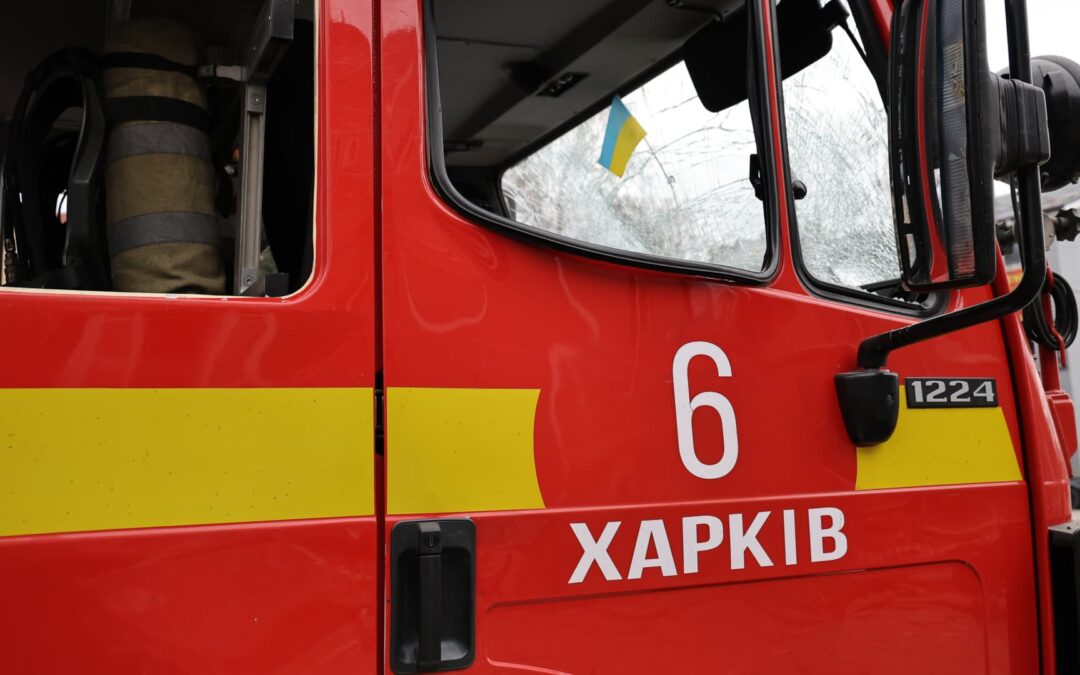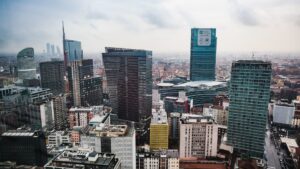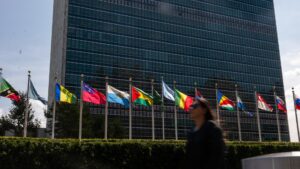Swiss to host peace summit in June, but Russia says it won’t attend
Switzerland has confirmed it will host a high-level conference on how to achieve peace in Ukraine, the Swiss government said late Wednesday.
The summit will take place on June 15-16 in the resort of Burgenstock. Ukraine is expected to use the event to promote its 10-point peace plan to end the war with Russia.
The conference — not the first to be held looking at ways to achieve a peaceful resolution to the 26-month conflict — is expected to focus on developing a “common understanding among the participating states with a view to achieving a comprehensive, just and lasting peace in Ukraine,” Switzerland’s Federal Council said in a statement.
It added that, after consulting international partners, “including G7 member states, the EU and representatives of the “Global South such as China, India, South Africa, Brazil, Ethiopia and Saudi Arabia,” it found that there was “sufficient international support for a high-level conference to launch the peace process.”
Swiss flags on houses along a street in Zug, Switzerland.
Armand Tamboly | Image Source | Getty Images
Ukraine’s “peace formula” calls for the complete withdrawal of all Russian troops from its territory, one of a number of a conditions that are seen as unlikely to be achieved after Russia annexed four Ukrainian regions and declared them to be Russian territory.
Russia has not been invited to this or previous peace conferences, raising question marks over how much such summits can achieve. A spokesperson at the Russian embassy in Switzerland confirmed to CNBC that it had not received an invitation to the forthcoming summit, saying that it would decline an invitation in any case.
“The idea of a ‘peace conference’ promoted by the organizers is inappropriate for us, as it is just another variant of pushing through an unviable ‘peace formula’ that does not take into account Russian concerns,” said Vladimir Khokhlov, press secretary at the embassy.
— Holly Ellyatt
Latest drone and missile strikes emphasize need for air defenses, Zelenskyy says
Russian drone and missile strikes targeting infrastructure in several regions across Ukraine early Thursday show the need for more air defense systems, Ukraine’s President Volodymyr Zelenskyy said.
More than 40 missiles and about 40 attack drones were involved in the latest attacks, Zelenskyy said on Telegram, noting that while some of the rockets and unmanned aerial vehicles were shot down, not all were intercepted.
“Russian terrorists once again targeted critical infrastructure objects. There was another vile missile attack on Kharkiv and the Kharkiv region. Objects in other regions were also targeted: Kyiv, Zaporizhzhya, Odesa, and Lviv,” Zelenskyy stated.
“Each of our neighbors in Europe, each of our other partners sees how critical Ukraine’s need for air defense is,” he said, adding, “Air defense and other defense support are needed, not turning a blind eye and long discussions.”
“If Russia is allowed to continue to do this, if Russian missiles and “Shaheds” [Iranian-made drones] will hit not only Ukraine, but also at the determination of its partners, this will be a global license for terror.”
Ukraine is growing frustrated at procrastination over additional military aid, with $60 billion of U.S. assistance blocked by Republican lawmakers. In the meantime, Ukraine’s military needs are acute, with reported shortages of manpower and critical artillery shells.
— Holly Ellyatt
Around 200,000 left without power after ‘massive’ attack on Kharkiv
Thousands of people have been left without power after an early-morning Russian missile and drone attack on the northeastern region of Kharkiv, officials said Thursday.
“This morning, another massive Russian attack on Ukraine’s energy sector. The enemy launched dozens of drones and missiles in Kharkiv, Kyiv, Zaporizhzhia and Lviv regions. Fortunately, there were no casualties,” Oleksiy Kuleba, the deputy head of the Ukrainian president’s office, said on Telegram.
More than 200,000 consumers were affected by the latest strikes in the Kharkiv region, he stated.
“The most difficult situation is in the Kharkiv region. There are more than 10 rocket strikes in the city alone. The terrorist country is trying to destroy Kharkiv’s infrastructure and leave the city in darkness. Currently, there are already power outages in the region — more than 200,000 consumers in the Kharkiv region are left without power supply,” he said.
A car tyre burns after a Russian precision-guided munition hit civil infrastructure in Kharkiv, northeastern Ukraine, in early April 2024.
Vyacheslav Madiyevskyy | Ukrinform | Future Publishing | Getty Images
Kharkiv Mayor Ihor Terekhov said Thursday that Russia had launched “at least 10 blows on the critical infrastructure of the city of Kharkiv and the region.”
There was no information on any casualties in the attacks, he said in his post on Telegram, and the authorities were working to fix power outages.
Russia denies deliberately targeting civilian infrastructure but has repeatedly targeted power networks in Ukraine, looking to destabilize and disable energy infrastructure.
— Holly Ellyatt
Zelenskyy says it is still possible for Ukraine to win war ‘but shortages do not advance victory’
Ukrainian President Volodymyr Zelenskyy inspects bunkers, firing ranges, armored personnel carrier trenches and anti-tank trench and receives information from officials during the visit to the Chernihiv Oblast in Ukraine on April 05, 2024.
Anadolu | Anadolu | Getty Images
Ukrainian President Volodymyr Zelenskyy on Wednesday called on allied countries to deliver air defense systems and fighter jets to Ukraine in order to help better protect cities amid Russia’s onslaught.
Zelenskky said via social media platform X that Ukraine also needs artillery to push back Russian forces on the frontline and called for further pressure to be exerted on the Kremlin to prevent President Vladimir Putin “from building up his military potential.”
“This is all entirely realistic,” Zelenksyy said, referencing remarks made in his address to the Delphi Economic Forum in Greece.
“And it only depends on our partners’ political will. Putin can only use his aggression to make up for the shortage of global solutions. A shortage that has gone on for too long. It is possible to win this war. But shortages do not advance victory,” he added.
— Sam Meredith
In pictures: Here are some of the latest images from the Russia-Ukraine war
Photos published via Getty Images over the last 24 hours in the Ukrainian city of Kharkiv show a damaged residential building, rescue workers taking cover during an air strike alarm and people visiting an area destroyed by Russian attacks.
This photograph taken on April 9, 2024, shows a residential building that was recently damaged during Russian attacks on the city, in Kharkiv, amid the Russian invasion of Ukraine.
Roman Pilipey | Afp | Getty Images
Maksym, 33, (L) and his wife Natasha, 39, visit their apartment that was heavily damaged during a recent Russian attack on the city, in Kharkiv, on April 9, 2024, amid the Russian invasion of Ukraine.
Roman Pilipey | Afp | Getty Images
Ukrainian rescue workers who arrived at a shelling site take cover in an underground passage during an air strike alarm, in Kharkiv, on April 9, 2024, amid the Russian invasion of Ukraine.
Roman Pilipey | Afp | Getty Images
People visit an area recently destroyed by recent Russian strikes in Kharkiv, on April 9, 2024, amid the Russian invasion of Ukraine.
Roman Pilipey | Afp | Getty Images
Russia’s Orsk refinery declares force majeure on fuel supply due to floods
An aerial picture taken on April 8, 2024 shows the flooded part of the city of Orsk, Russia’s Orenburg region, southeast of the southern tip of the Ural Mountains. Russia said on April 8, 2024 that more than 10,000 residential buildings were flooded across the Urals, Volga area and western Siberia as emergency services evacuated cities threatened by rising rivers. On April 7, Russia declared a federal emergency in the Orenburg region, where the Ural river flooded much of the city of Orsk and is now reaching dangerous levels in the main city of Orenburg. Much of the city of Orsk has been flooded after torrential rain burst a nearby dam. (Photo by Anatoliy Zhdanov / Kommersant Photo / AFP) / Russia OUT (Photo by ANATOLIY ZHDANOV/Kommersant Photo/AFP via Getty Images)
Anatoliy Zhdanov | Afp | Getty Images
Russia’s Orsk oil refinery, which has halted output after widespread floods, declared force majeure on fuel supplies from April 8, according to a document issued by plant owner Forteinvest and seen by Reuters.
Russia’s oil refineries were already struggling with Ukrainian drone attacks and technical outages, forcing the country to ban gasoline exports, with some exceptions, for half a year from March 1.
Forteinvest said the plant had been shut to avoid ecological risks and ensure labour safety. Last year the refinery processed 4.5 million metric tons (90,000 barrels per day) of oil.
Floods engulfed cities and towns across Russia and Kazakhstan on Wednesday after Europe’s third-longest river burst its banks, forcing about 110,000 people to evacuate and swamping parts of the Russian city of Orenburg.
— Reuters
Flood water in Russia’s Orenburg exceeds dangerous level
A picture taken on April 8, 2024 shows rescuers evacuating residents from the flooded part of the city of Orsk, Russia’s Orenburg region, southeast of the southern tip of the Ural Mountains.
Anatoliy Zhdanov | Afp | Getty Images
The water level in the Ural River in the city of Orenburg, an epicenter of dramatic flooding in southern Russia, has risen to 996 cm, the city’s Mayor Sergei Salmin said on the Rossiya-24 TV channel Wednesday.
The level is reportedly 66 cm above the danger level and higher than readings taken earlier this morning, news agency TASS reported.
“At 12 o’clock local time (10:00 a.m. Moscow time) the water is still rising, now we have already exceeded all the highest marks. Our dangerous value is 930 cm. At the moment we have already recorded 996 cm,” Salmin said, TASS noted.
He said 1,910 households were now flooded and 865 people had been evacuated from the city. Salmin said evacuations continued.
— Holly Ellyatt









